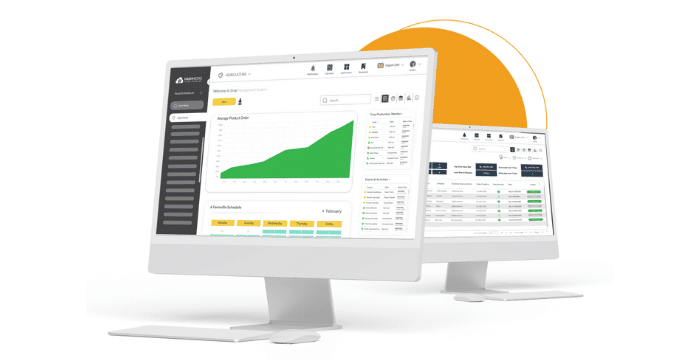Urban farming has become increasingly popular in recent years, especially in densely populated densely areas like Indonesia and Singapore, where land scarcity is a significant issue. With a limited amount of arable land available for traditional agriculture, it has emerged as a viable solution for producing fresh, healthy produce within city limits. However, managing an urban farm comes with several challenges, and farmers need to be equipped with the right tools to ensure their success.
By leveraging technology, farmers can overcome the challenges of land scarcity and manage their resources effectively. One such tool is farm management software that urban farmers use to optimize their yields. With the growing interest in sustainable living and healthy eating, urban farming will continue its upward trend, and farm management software will play a crucial role in its success.
Table of Content:
Table of Content

What is Urban Farming?
Urban farming refers to the practice of growing and cultivating crops, raising animals, and producing food in or around cities. This form of agriculture has gained popularity in recent years as a sustainable and eco-friendly way of producing fresh, healthy food. It can take many forms and be carried out in various spaces, including vacant lots, public parks, and community gardens.
Types of Urban Farming
There are a variety of different types of urban farming, each with its own unique methods and benefits. From rooftop gardens to livestock, urban farming offers a wide range of possibilities for growing fresh produce and connecting with the community.
Rooftop Gardening
Rooftop gardening is a type of urban farming involving growing rooftop plants, such as tomatoes, peppers, and potatoes. This type of farming is ideal for urban areas with limited space. Rooftop gardens can be created on residential, commercial, and industrial buildings. They help reduce the urban heat island effect, improve air quality, and provide fresh produce for local communities.
Vertical Farming
Vertical farming involves growing crops in stacked layers or vertical racks. It is suitable for growing strawberries, lettuce, and mushrooms. It uses hydroponic or aeroponic systems to grow crops without soil, making it more efficient than traditional farming. This method allows for year-round production, reduces the need for land and water, as well as enabling farmers to grow crops in areas with limited space.
Livestock
Livestock rearing is also a type of urban farming, although it may be less common in densely populated areas. It can be done in backyards or small farms within the city limits with sufficient space and resources. Livestock such as chickens, rabbits, and bees can be raised in urban areas for meat, eggs, honey, and other fresh products to local communities. It provides an additional source of income and contributes to food security.
Benefits of Urban Farming
Urban farming is becoming popular as society recognizes the significant impact it can have on their communities and the environment. This type of farming benefits both individuals and businesses in so many ways. Here are some of the benefits it offers to businesses:
- Environmental benefits: By growing food locally, businesses can reduce the carbon footprint associated with transporting food over long distances. Additionally, urban farming can help to reduce the amount of waste produced by businesses, as food scraps can be composted and used to fertilize plants.
- Cost-saving: Growing their own produce enables businesses to reduce their reliance on expensive grocery stores and suppliers, resulting in lower food costs. Moreover, businesses can often sell their surplus produce, generating additional revenue for the company.
- Community engagement: Businesses engaging in urban farming can host workshops and events concerning gardening and healthy eating, by working with local schools and organizations. This type of community engagement builds a positive reputation for the business and fosters stronger relationships with customers and community members.
Implementing a few key practices can help ensure community gardens thrive, even during the hotter months.
Key Features of Farm Management Software for Urban Farming
As urban farming gains popularity, more and more farmers are looking for ways to streamline their operations and increase efficiency. One tool that can help you achieve these goals is farm management software. Here are some of its key features:
Agribusiness activity management
One of the key features of farm management software is its ability to manage agribusiness activities. This includes everything from planting and harvesting to pest control and irrigation. With the software, farmers can track and manage all activities related to their crops, The software also helps in crop monitoring and keeping track of crop health. As a result, all agribusiness operations are on schedule and run smoothly.
Financial activity management
Another important feature of this software is its financial activity management capabilities. The software provides a financial dashboard, enabling farmers to organize and accurately track all agricultural operations expenses and income in real-time. Additionally, this feature helps you to know your overall production cost and analyze profitability.
Automated reminder and report generation
The software also provides automated reminder and report generation features to help urban farmers stay on top of their tasks and data analysis. Farmers can schedule regular and automatic harvest care arrangements, as well as infrastructure maintenance. Meanwhile, reports can be generated to show data on crop growth, yield, and overall farm performance. This helps them keep track of the overall progress of their farm.
Conclusion
Urban farming has become an essential part of sustainable agriculture. By incorporating it into their operations, businesses can enhance their social and environmental impact, while also improving their bottom line. However, it requires efficient management to thrive. The use of farm management software can significantly streamline the processes involved in urban farming.
By utilizing software such as HashMicro’s Smart Agriculture Solution, farmers can optimize their operations and save time and resources to maximize yields and profitability. With its advanced tools, you can stay ahead of the curve and reap the benefits of urban farming. Adopt this solution now and get up to 50% off on the Productivity Solutions Grant!























































